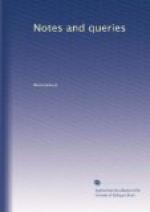Separation of the Sexes in Time of Divine Service.—I note with pleasure that traces of this ancient usage still exist in parts of Sussex. In Poling Church, and also in Arundel Church, the movable Seats are marked with the letters M. and W. respectively, according as they are assigned to the men or women. On the first Sunday in the year I attended service in Arundel Church, and observed, with respect to the benches which were placed in the middle of the nave for the use of the poorer classes, that the women as they entered proceeded to those at the eastern end, which were left vacant for them, whilst the men by themselves {95} occupied those at the western end. The existence of a distinction of this kind in regard to the open seats only, affords strong proof, if proof were necessary, that it was the introduction of appropriated pews which led to the disuse of else long established, and once general, custom of the men occupying the south side of the nave, and the women the north.
B.H.B.
Error in Winstanley’s Loyal Martyrology.—Winstanley, in The Loyall Martyrology (London, printed by Thomas Mabb, 1665), p. 67., says of Master Gerard, the author of that elaborate herbal which bears his name—“This gallant gentleman, renowned for arts and arms, was likewise at the storming of that (Basing) House unfortunately slain.” According to Johnson, who edited his Herbal in 1633, Gerard was born at Namptwich, in Cheshire, in the year 1545; and died about 1607. Basing House was stormed Oct. 1645: had Gerard served there, he would have been 100 years old. It appears that Winstanley has confounded Gerard with his editor Thomas Johnson above mentioned, who was killed during the siege of Basing House, anno 1644. (See Fuller’s Worthies, vol. iii. p. 422. edit. 1840. London.)
E.N.W.
Preaching in Nave only.—Prayers and Preaching distinct Services—In Ely Cathedral the old and proper custom of sermons being delivered in the nave only is still maintained. And this observance has doubtless led to the continuance of another, which is a sufficient answer to those who object to the length of our service, as it shows that formerly in practice, as still in principle, prayers and preaching were distinct services. In the morning of Sunday there is no sermon in either of the parish churches in Ely, but prayers only; and those of the respective congregations who wish to hear a sermon remove to the cathedral, where they are joined by the ecclesiastics and others who have “been to choir”. Consequently, any one may “go to sermon” (I use the language of the place) without having been to prayers, or to prayers in one of the parish churches, or the choir, without necessarily hearing the sermon.
I think it would be very interesting, if your widely scattered correspondents would from time to time communicate in your columns such instances of any variation from the now usual mode of celebrating divine service as may fall under their personal observation.




